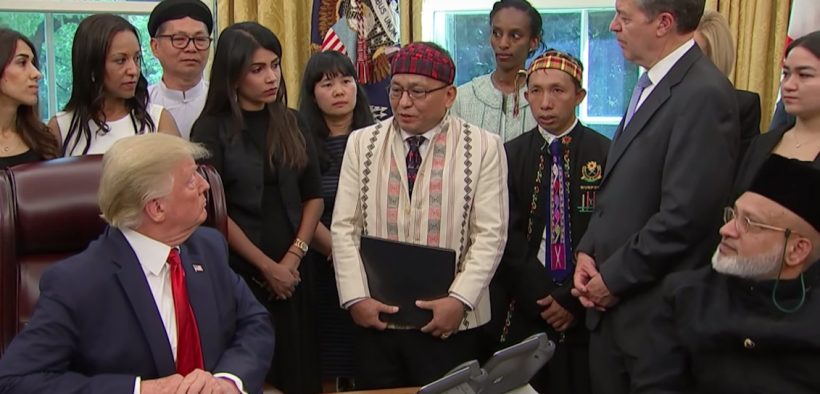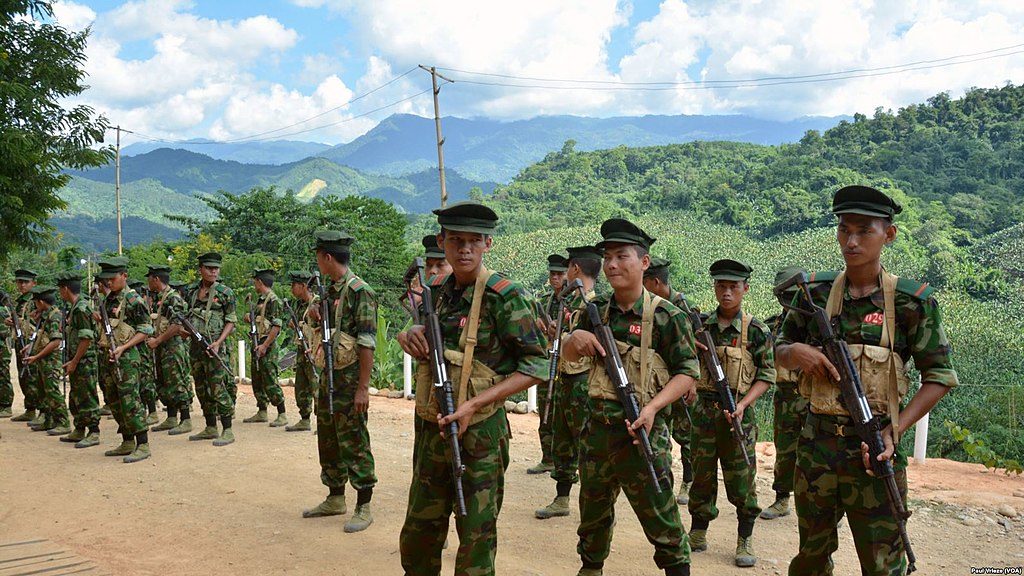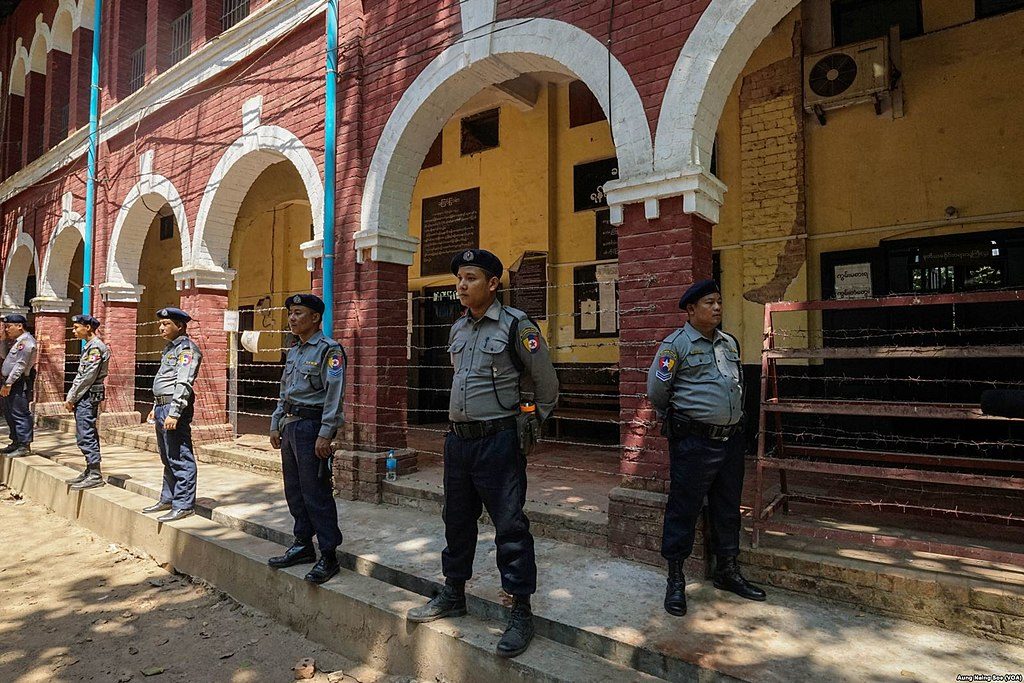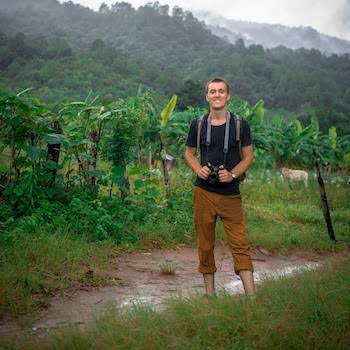Myanmar Military Drops Defamation Lawsuit Against Baptist Leader Who Asked Trump For Help

Following a string of Myanmar government crackdowns on outspoken critics, one Myanmar Baptist leader faced a military lawsuit after a 40-second meeting with President Trump.
“Reverend Samson, you want to tell, briefly, your story?”
Sam Brownback steps back and Reverend Dr. Hkalam Samson steps toward U.S. President Donald Trump. Reverend Samson is head of Myanmar’s Kachin Baptist Convention. He wears a black-and-red cap that sits above his ears and an ivory jacket with muted pink-and-green embroidery. It takes Reverend Samson about 20 words to get to “torture.”
Brownback is the U.S. ambassador-at-large for international religious freedom. It’s mid-July at the White House. He’s invited a small group of religious minority representatives from around the world to meet Trump, including Reverend Samson and Langjaw Gam Seng, another Kachin pastor who served 16 months in prison for working with journalists to document Myanmar military airstrikes in nearby Shan State.
“As Christians in Myanmar, we have been very oppressed and tortured by the Myanmar military government. We don’t have a chance… for religious freedom,” Samson tells Trump. He asks for the American government to support ethnic leaders in Myanmar to work toward democracy and federalism.
Reverend Samson gets 40 seconds to give Trump his message. The president thanks him and the meeting moves on. By the end of August, the Myanmar military will have sued him over his comments to Trump. The U.S. will actually speak out in support of Samson, though it’s not clear if this is what kept him out of prison.
Samson Thanks Trump, US Government For Sanctions
Samson is a leader from Kachin State, a large Christian-majority area in Myanmar’s north. The Kachin Independence Army (KIA) and other ethnic armed groups have been fighting the Myanmar military, also known as the Tatmadaw, in the area off-and-on since 1962 and 130,000 people are internally displaced.

Cadets from the Kachin Independence Army (KIA) preparing for military drills at the group’s headquarters in Laiza, Kachin State, Myanmar. (Photo: Paul Vrieze, VOA)
Samson also used a few of his seconds with Trump to thank the U.S. government for sanctioning Tatmadaw generals who oversaw the ethnic cleansing of Rohingya Muslims in Rakhine State.
On July 16, the day before Samson visited the White House, the U.S. Department of State publicly barred four leaders of the Myanmar military and their families from entering the U.S.
“We remain concerned that the Burmese government has taken no actions to hold accountable those responsible for human rights violations and abuses, and there are continued reports of the Burmese military committing human rights violations and abuses throughout the country,” read a statement from Secretary of State Mike Pompeo.
Myanmar Lieutenant-Colonel Accuses Samson of Defamation
After the pastors’ visit, Baptist leaders in the U.S. were worried the two would face reprisal. They wrote to U.N. Secretary-General António Guterres and U.S. government officials expressing concern that Samson and Langjaw Gam Seng were in “imminent danger.” U.S. Ambassador to Myanmar Scot Marciel met them at the airport in Yangon and they returned to Myitkyina, the capital of Kachin State.
But soon afterward, Lieutenant-Colonel Than Htike of the Myanmar military’s Kachin State branch filed a lawsuit against Samson accusing him of defamation. The legal complaint mentioned Samson’s comments to Trump.
The Kachin Baptist Convention released a statement in response to the lawsuit. It quotes the Bible, John 8:32: “The truth shall set you free.”
According to Samson, the military offered to drop the lawsuit in exchange for a letter of confession. Instead, he wrote on Facebook: “I don’t want to trade off the truth [for] my own individual escape. I would like to give respect to all who are murdered, raped and tortured wrongfully during the 60 years of blood-shedding oppression.”
Samson is referring to the decades of conflict between ethnic armed groups and the Myanmar military.
US Condemns Myanmar Military Lawsuit
Media attention mounted around the case and the Department of State soon condemned the lawsuit.
“The Lieutenant Colonel’s criminal complaint against Reverend Samson seeks to unduly limit his freedom of expression and potentially could disrupt his critical work on behalf of tens of thousands of internally displaced people,” read the statement from the Department of State.
The statement is notable for the attention it pays to a specific case, but the language it uses is standard low-commitment U.S. foreign policy: “A decision to pursue this criminal complaint and arrest Reverend Samson on the basis of his protected speech would be deeply troubling.”
Myanmar Military Rescinds Legal Complaint Against Samson
It’s not clear how much of an impact the statement had on the Myanmar military or what negotiations were happening behind the curtain, but on September 9, a Kachin State judge announced that the military had rescinded the legal complaint against Samson.
“I’m happy about the Tatmadaw’s constructive decision,” Samson said. “Growing international [pressure] probably led to the decision.”
Gum San Nsang, president of the Kachin Alliance, a community-based organization in Kachin State, believes that U.S. policy on Myanmar still has a long way to go.
“The U.S. government has been fairly soft on the Burmese military. With sustained advocacy from the American religious community, it will push the U.S. Government to make changes to its current policy,” Gum San Nsang told Citizen Truth. “[The Burmese military] is currently in the crosshairs of international investigation for genocide, ethnic cleansing and crimes against humanity. A shift in U.S. foreign policy could empower U.N. member states which believe Burmese generals should be referred to a special tribunal.”
Reverend Samson’s Lawsuit Is Not An Isolated Case
Cases like Reverend Samson’s have become common in Myanmar. The military and government officials use the country’s legal system, and charges like defamation, to target critics or those they see as threatening a particular national agenda, much as they did while the country was under military rule.
Two Reuters reporters spent 16 months in prison for crimes related to reporting on the Inn Din massacre of Rohingya civilians in September 2017. The imprisonment of U Wa Lone and U Kyaw Soe Oo drew widespread condemnation, including from Pope Francis. As many as 50 reporters have faced charges since Aung San Suu Kyi’s National League for Democracy (NLD) party won elections in 2015.

Myanmar police officers stand on guard outside a courtroom in Insein Township during Wa Lone and Kyaw Soe Oo’s trial. (Photo: Aung Naing Soe, VOA – Public domain)
The court hadn’t yet determined which legal code to apply in Samson’s case but it could have been the same defamation charge that a judge used to send Langjaw Gam Seng to prison.
Rakhine human rights activist Khaing Myo Thun spent 19 months behind bars on charges of defamation and incitement following a statement by the Arakan Liberation Party that implicated the Myanmar military in torture, forced labor and forced evictions.
Samson Seeks Support For Federalist Democracy, Religious Freedom
Reverend Samson asked Trump to support Myanmar to transition to a federalist democracy—meaning that ethnic areas and states like Rakhine and Kachin would have increased autonomy. He also asked the U.S. government to help stop religious persecution and promote religious freedom.
Gum San Nsang says the military’s reaction to Samson’s comments isn’t new.
”Burma is an intolerant society. No one is above the military, not even the law of the land. Since the military coup of 1962, the Burmese military remains the hegemonic power of the country,” said Gum San Nsang. “There are very few activists in Burma who haven’t set foot in prison, even during this ‘transition’ era.”
According to Gum San Nsang, the case against Reverend Samson was unusual because it targeted a religious leader. “On the other hand, a Buddhist extremist monk like [U] Wirathu who continually spews hatred and bigotry is protected.”
Myanmar Military Insists ‘Free Will’ Compelled Lawsuit Withdrawal
The Myanmar military maintains that international pressure didn’t play a role in their decision to drop the suit against Samson.
“We withdrew the case before the court decided whether Dr. Hkalam Samson was to be charged. The reason for dropping the case is based on free will and not because of any pressure,” said Brigadier General Zaw Min Tun, spokesperson for the Myanmar military.
Reporters at The Irrawaddy and other news outlets attempted to reach the lieutenant-colonel for comment, but he did not respond.











